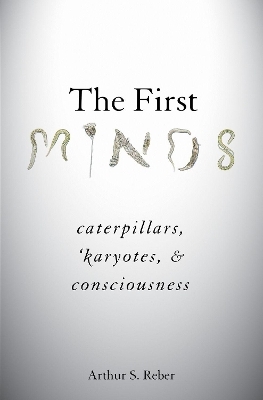
The First Minds
Oxford University Press Inc (Verlag)
978-0-19-085415-7 (ISBN)
First Minds: Caterpillars, 'Karyotes, and Consciousness presents a novel theory of the origins of mind and consciousness dubbed the Cellular Basis of Consciousness (CBC). It argues that sentience emerged with life itself. The most primitive unicellular species of bacteria are conscious, though it is a sentience of a primitive kind. They have minds, though they are tiny and limited in scope. Hints that cells might be conscious can be found in the writings of a few cell biologists but a fully developed theory has never been put forward before.
Other approaches to the origins of consciousness are examined and shown to be seriously or fatally flawed, specifically approaches based on: (a) the assumption that minds are computational and can be captured by an Artificial Intelligence, (b) efforts to discover the neuro-correlates of mental experiences and, (c) looking for consciousness in less complex species by identifying those that have precursors of those neuro-correlates. Reber shows how each of these approaches is shown to be either essentially impossible (the AI models) or so burdened by philosophical and empirical difficulties that they are effectively unworkable.
The CBC approach is developed using standard models of evolutionary biology. The remarkable repertoire of single-celled species that micro- and cell-biologists have discovered is reviewed. Bacteria, for example, have sophisticated sensory and perceptual systems, learn, form memories, make decisions based on information about their environment relative to internal metabolic states, communicate with each other, and even show a primitive form of altruism. All such functions are indicators of sentience.
Finally, the implications of the CBC model are discussed along with a number of related issues in evolutionary biology, philosophy of mind, the possibility of sentient plants, the ethical repercussions of universal animal sentience, and the long-range impact of adopting the CBC stance.
Arthur S. Reber earned his Ph.D. from Brown University (1967). He was in the Psychology Department of the University of British Columbia from 1966 to 1970 when he moved to Brooklyn College and the Graduate Center of the City University of New York. After retiring in 2005, he returned to UBC as a Visiting Professor. Reber is a Fellow of the Association for Psychological Science and the American Association for the Advancement of Science, and was a Fulbright Professor 1977-1978 in Innsbruck, Austria. He is also a lexicographer (Dictionary of Psychology - Penguin), a novelist (Xero to Sixty - Create Space), and an authority on poker and gambling (Poker, Life and Other Confusing Things -- Conjelco, The New Gambler's Bible -- Three Rivers, and Gambling for Dummies -- Wiley, with L. Krieger and R. Harroch).
Table of Contents
Preface
Where the Voyage Began: A Personal Note
A Quick Overview
An Aside on Terminology
An Aside on the Nature of Philosophic Argument
Distinguishing between Evolutionary Biology and Evolutionary Psychology
A Note on Citations
Summary
Chapter I : Can Robots be Conscious?
Functionalism or the Possibility of "Hardware-Independent" Consciousness
What Do I/You Know about Minds? Yours and/or Mine?
Is there Something It Is Like To Be a Robot?
John Searle's Chinese Room
The Anthropomorphic "Tug"
Summary
Chapter II: Why Has A CBC-Type Model Not Been Proposed Before?
My Propaedeutic Caterpillar
Three Reasons for Hesitating
In Defense of Anthropomorphism
A Short Aside on Fish Pain? An Object Lesson
Those Who Are, Might Be, or Perhaps Should be Comfortable with Sentient cells
Summary
Chapter III. Bio-centric Views of the Origin of Consciousness: The Search for the Solution to the Hard Problem
General Theories of the Origins of Consciousness
Phylogenetic Searching for the First Appearance of Consciousness
Some Thoughts on These Efforts
Stumbling into a Category Error
The Emergentist's Dilemma
Anticipating Criticism: Some Prophylactic Arguments
Summary
Chapter IV: Where we Get Serious: The Cellular Basis of Consciousness
Common Threads with Other Areas of Research
A Short Aside on a Personal Bewilderment
A Short Aside on which Unicellular Species We're Talking About
The Cellular Basis of Consciousness Framework
A Closer Look at Unicellular Life
Summary
Coda: Anticipating Criticism (once more) and Defending Against it
Chapter V: Entailments of the Cellular Basis of Consciousness Stance
On Evolution's Hierarchical Structure
Reductionism
Avoiding Mysterianism
Empirical Problems Searching for Solutions
Plants
Ethical Considerations
A Short Aside on Altruism and Cooperation
Secondary Gains
Summary
Appendix A: An Exercise in Lexicography: Defining (?) Consciousness
Appendix B: The Cambridge Declaration on Consciousness, with Commentary
References
| Erscheinungsdatum | 23.11.2018 |
|---|---|
| Verlagsort | New York |
| Sprache | englisch |
| Maße | 236 x 160 mm |
| Gewicht | 567 g |
| Themenwelt | Geisteswissenschaften ► Philosophie |
| Geisteswissenschaften ► Psychologie ► Allgemeine Psychologie | |
| Geisteswissenschaften ► Psychologie ► Verhaltenstherapie | |
| Medizin / Pharmazie ► Studium | |
| Naturwissenschaften ► Biologie ► Humanbiologie | |
| Naturwissenschaften ► Biologie ► Zoologie | |
| ISBN-10 | 0-19-085415-4 / 0190854154 |
| ISBN-13 | 978-0-19-085415-7 / 9780190854157 |
| Zustand | Neuware |
| Informationen gemäß Produktsicherheitsverordnung (GPSR) | |
| Haben Sie eine Frage zum Produkt? |
aus dem Bereich


